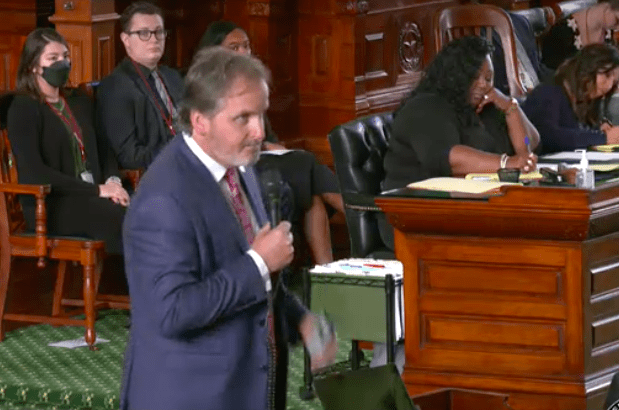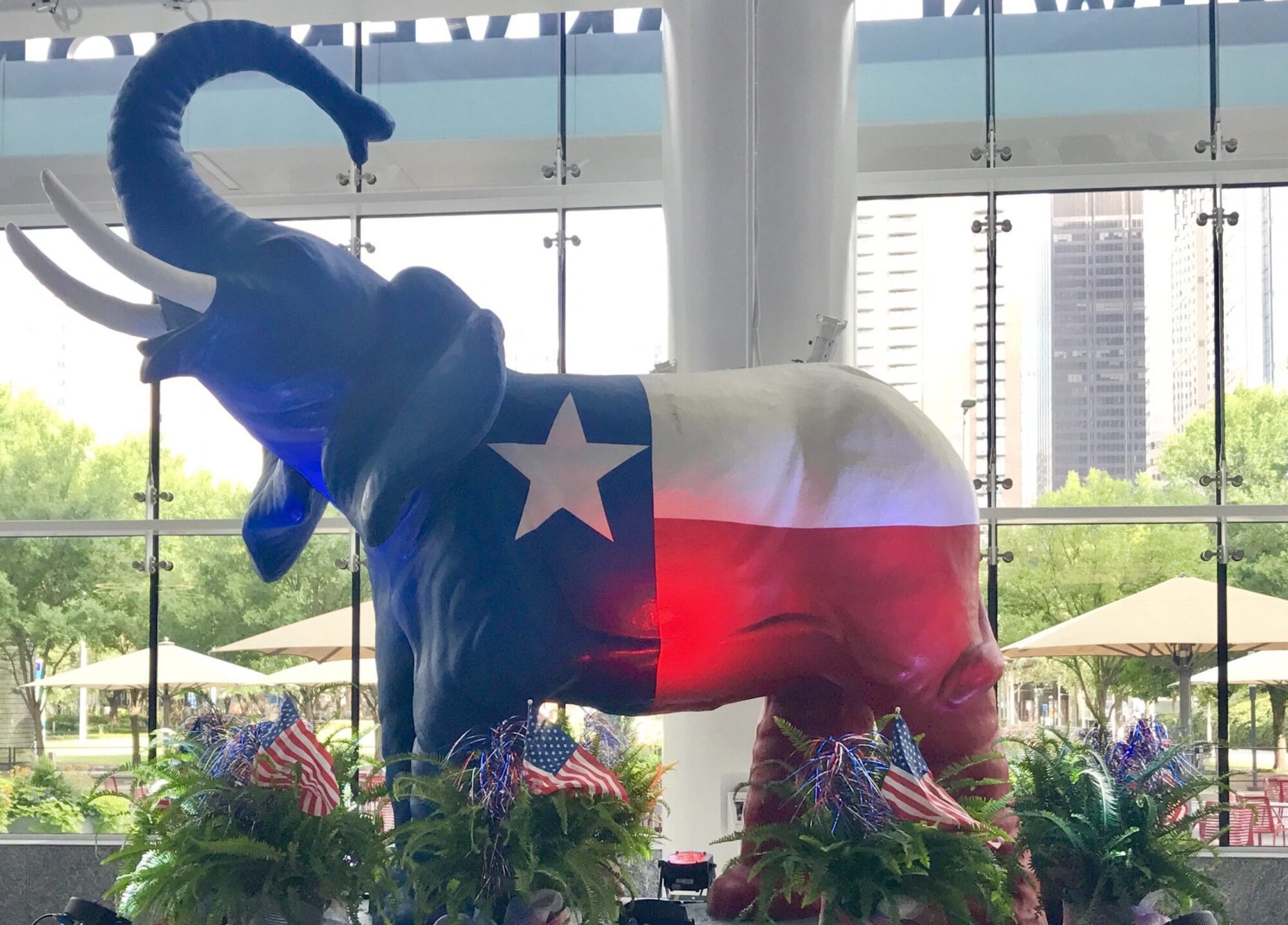Republican lawmakers are getting a second chance during a special session to pass reforms that restore voters’ confidence in Texas elections—a priority the GOP-controlled Legislature failed to accomplish during its regular session, even as other Republican-run states enacted comprehensive election reforms to make voting more secure.
But Democrats are threatening to again use “every option” to block Republicans’ election security bills, which one House Democrat called “problematic.”
Thursday morning, as the first of multiple planned special sessions convened, the Texas House and Senate both unveiled comprehensive election reform bills that are similar to legislation considered during the regular session.
As in the regular session, the House and Senate bills are different from each other—but they’re more alike than before.
House Bill 3
State Rep. Andrew Murr (R–Junction) filed House Bill 3, a revised version of the Election Integrity Protection Act of 2021 filed by State Rep. Briscoe Cain (R–Deer Park) during the regular session.
Like the previous House omnibus bill, HB 3 bans paid vote harvesting, paid voter assistance, and unsolicited distribution of mail-ballot applications by public officials (all with felony penalties); requires assistants to complete a form and take an oath under penalty of perjury (a felony) that they didn’t coerce the voter; and provides most of the same poll watcher protections, including allowing observers to be “near enough to see and hear” election workers’ activities.
Murr’s bill has provisions somewhat similar to Cain’s that prioritize election-related court proceedings, due to their time-sensitive nature.
HB 3 also requires voters to provide an ID number on mail-in ballots and applications, in line with rules for in-person voting, as well as original ink signatures on applications; sets uniform early voting hours, generally 6 a.m. to 10 p.m. and 9 a.m. to 10 p.m. on Sundays; bans unmanned mail-ballot drop boxes; sets procedures for verifying mail ballots and allowing voters to correct defects; directs the secretary of state to set uniform procedures for closing polling places at the end of an election day; and allows counties that use voting systems with hand-marked paper ballots to implement countywide polling places—provisions not included in Cain’s original bill.
The House bill adds a few new election fraud offenses but maintains the current misdemeanor penalty except for offenses committed by election officials, and includes a stronger limit on any official’s ability to unilaterally change or ignore election rules put in place by the Legislature:
[A] public official may not create, alter, modify, waive, or suspend any election standard, practice, or procedure mandated by law or rule in a manner not expressly authorized by this code.
As anticipated, HB 3 and other House election bills were referred to Phelan’s newly appointed Select Committee on Constitutional Rights and Remedies, not the House Elections Committee chaired by Cain. The committee has scheduled a public hearing on the bill for Saturday morning starting at 8 a.m.
Texans can testify in person or submit comments online.
State Rep. Jacey Jetton (R–Sugar Land) said Friday that the committee will hear testimony on two bail reform bills on the agenda before taking up HB 3, and he expects the hearing may last “until Sunday.” During the regular session, public testimony on the House election integrity omnibus lasted 17 hours in a hearing that spanned two days.
Senate Bill 1
State Sen. Bryan Hughes (R–Mineola) filed Senate Bill 1, which is similar to the comprehensive “omnibus” election integrity bill he filed during the regular session, but as before, it differs from the House omnibus bill.
Like Hughes’ previous bill, SB 1 contains dozens of reforms sought by election integrity advocates to make voting more secure.
Similar to HB 3, SB 1 requires voters to provide an ID number on mail-in ballots and applications, as well as original ink signatures on applications; sets uniform early voting hours (between 6 a.m. and 9 p.m.); protects poll watchers, including allowing observers to be “near enough to see and hear” election workers’ activities; bans paid vote harvesting, unmanned mail-ballot drop boxes, and unsolicited distribution of mail-ballot applications by public officials; sets procedures for verifying mail ballots and allowing voters to correct defects; requires voter assistants to complete a form and take an oath; directs the secretary of state to set uniform procedures for closing polling places at the end of an election day; and prioritizes certain election-related court proceedings.
Both bills include the same limit on officials’ ability to unilaterally change or ignore election laws.
SB 1 also bans pre-filled voter registration applications and “drive-thru” voting; requires voters who don’t return their mail ballots to cast a provisional in-person ballot; imposes civil penalties, including fines, on election officials who violate code; adds a civil liability for illegal vote harvesting; and allows money damages in election contests involving fraud.
It implements a number of safeguards for ballot tabulation and central counting, including live-streamed video surveillance of voted ballots at central counting stations (optional for counties of fewer than 100,000 residents).
Hughes’ bill also adds procedures to identify and remove registered voters who self-identify as noncitizens, similar to Senate Bill 31 by State Sen. Charles Perry (R–Lubbock)—a revival of his SB 155 that nearly passed in the regular session.
Several other standalone election bills have been filed addressing provisions in the omnibus bills, including voter ID for voting by mail (Senate Bill 22).
SB 1 and SB 31 were referred to Hughes’ Senate State Affairs Committee, which is holding a public hearing on the bills Saturday morning starting at 11 a.m., overlapping the House hearing on HB 3.
Democrat Opposition
Republicans control both chambers, but House Democrats are still threatening to break quorum to block a vote on any election security legislation they oppose.
On Monday, three dozen Democrat lawmakers submitted a list of demands to House Speaker Dade Phelan detailing how the House should operate during the special session, with several specific dictates for deliberating election integrity measures.
That letter and public remarks by multiple lawmakers renew House Democrats’ threat to break quorum in order to avoid voting on election bills. Near the end of the regular session, Speaker Phelan allowed Democrats to leave the House chamber, blocking a vote on Republicans’ last-minute version of election integrity reform.
At least 51 representatives would need to flee to bust the two-thirds (100-member) quorum required to conduct House business.
“We’re going to fight these bills tooth and nail. Every option is on the table,” State Rep. Armando Walle (D–Houston) said at a House Democrat Caucus press conference following the chamber’s brief opening session on Thursday morning. Walle is also a leader of the Mexican American Legislative Caucus, longtime opponents of election security measures they say disproportionately impact Hispanic voters.
Caucus Chairman Chris Turner (D–Grand Prairie) told the press HB 3 has “a number of problematic provisions” but didn’t say what they were, and he repeated his frequent claim that the bill is “based on a big lie” that Donald Trump won the 2020 presidential election.
Yet this year’s election reform priorities were much the same as in past sessions: clean up voter rolls, secure mail ballots, stop illegal voter assistance, make sure voting machines produce accurate results, and punish cheaters.
Republican Priority
Election integrity was a legislative priority for grassroots conservatives, the Texas GOP, and Republican Gov. Greg Abbott this session, after lawmakers failed to pass proposed reforms in 2019. Advocates became more alarmed as officials used coronavirus concerns as an excuse to alter voting rules without legislative oversight.
The Republican-controlled Legislature sent a handful of key election integrity bills to the governor’s desk, but failed to pass advocates’ top-priority comprehensive election reform before the 140-day regular session ended on May 31.
Yet other Republican-run states, including Florida and Georgia, passed comprehensive election reform bills this year within much shorter legislative sessions.
Democrats in Texas and nationwide have unleashed a continuous stream of coordinated attacks on the reforms, demonizing election integrity as “voter suppression” and “bad for business.”
Texas Republicans now have a second chance to overcome Democrat opposition and deliver the election-reform results their constituents called for.
Resources to help citizens engage in the legislative process are available at Texas Legislature Online. Contact information for elected officials can be found at Texas Directory.





